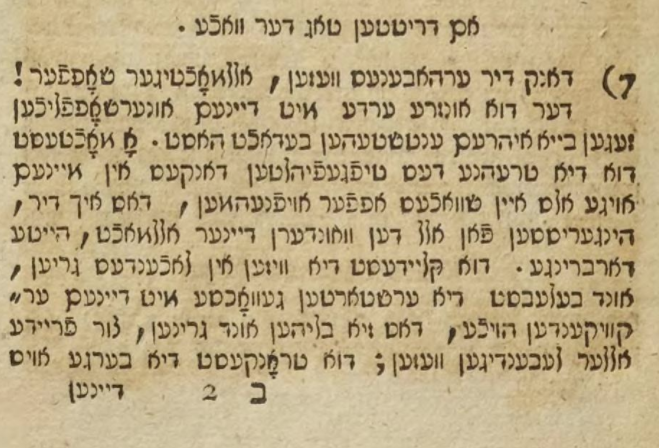| Source (German) | Translation (English) |
|---|---|
|
Am dritten Tag der Woche.
|
On the third day of the week.
|
|
Dank dir, erhabenes Wesen, allmächtiger Schöpfer! der du unsere Erde mit deinem unerschöpflichen Segen bei ihrem Entstehen bedacht hast. O, möchtest du die Thräne des tiefgefühlten Dankes in meinem Auge als ein schwaches Opfer aufnehmen, das ich dir, hingerissen von all den Wundern deiner Allmacht, heute darbringe. Du kleidest die Wiesen in labendes Grün und belebst die erstarrten Gewächse mit deinem erquickenden Hauche, daß sie blühen und grünen, zur Freude aller lebendigen Wesen; du tränkst die Berge aus deinen Höhen und die Erdbewohner sättigen sich von den Früchten, die dein Werk sind. Du lehrst sie Brod aus der Erde ziehen, und Wein, daß er des Menschen Herz erfreue (Psalm 104, 15) — erheiterndes Oel, erquickend Brod.
|
Thank you, sublime Being, almighty Creator! who has bestowed your inexhaustible blessings on our earth at the time of its creation. O, may you receive the tear of heartfelt gratitude in my eye as a faint offering, which I, enraptured by all the wonders of your omnipotence, offer to you today. You clothe the meadows in refreshing green and revive the frozen plants with your refreshing breath, so that they blossom and green, to the joy of all living beings; you water the mountains from your heights and the inhabitants of the earth fill themselves with the fruits that are your work. You teach them to draw bread from the earth, and wine to gladden the heart of man (Psalms 104:15) — uplifting oil, refreshing bread.
|
|
Aber Dank, unendlichen, höhern, heiligern Dank dir, Allgütiger, dafür, daß du mir das köstliche Geschenk der Vernunft verliehen hast, welches mich allein von dem Thiere unterscheidet, das nur den irdischen sinnlichen Genuß kennt. Die Vernunft ist es, die mir auch hier, nächst deiner göttlichen Lehre, die du uns aus Gnade offenbart hast, die entzückende Aussicht in das Reich einer höhern Welt und eines seligen Zustandes eröffnete.
|
But thanks, endless, higher, holier thanks to you, All-Good One, for having given me the precious gift of Reason, which alone distinguishes me from the animal that knows only earthly sensual pleasure. It is Reason, which also here, next to your divine teaching, which you have revealed to us by grace, opened to me the delightful prospect of the realm of a higher world and a blissful state.
|
|
Ja, der leblose Baum, der nach einer langen winterlichen Erstarrung, zu neuem, kräftigen Leben aufblühet, und sich jeden Frühling wieder verjüngt, — in ihm erblicke ich das entzückende Bild der Wiederbelebung und der ewigen Fortdauer nach dem zeitlichen Tode.
|
Yes, the lifeless tree that blossoms into new, vigorous life after a long winter torpor, and rejuvenates itself every spring, — in it I see the delightful image of revival and eternal continuity after temporal death.
|
|
O laß auch in diesen Jahren die unendlich mannigfachen Arten von Erzeugnissen, die du alle zur Freude und Lust, zur Nahrung und Lebenserhaltung deiner Geschöpfe bereitet hast, genädig gedeihen! Laß die gesegneten Felder den Schweiß des Menschen lohnen, der sie bebaut, auf daß wir alle mit fröhlichem Herzen dir dienen mögen.
|
O let also in these years the infinitely varied kinds of products, which you have prepared for the joy and pleasure of all, for the nourishment and life-support of your creatures [to] graciously flourish! Let the blessed fields reward the sweat of the man who cultivates them, so that we may all serve you with a joyful heart.
|
|
Mögen wir aber beim Ueberfluß irdischer Güter unsere erhabene Bestimmung nicht vergessen; mögen wir stets eingedenk sein, daß das wahre Gute etwas höheres, heiligeres ist, als alles was die Erde geben kann. Diesen Segen, diese Erkenntniß verleihe uns um aller Frommen und Guten und um deines Volkes Israel willen. Amen.
|
But may we not forget our sublime destiny in the abundance of earthly goods; may we always be mindful that the true good is something higher, holier than anything the earth can give. This blessing, this knowledge, grant us for the sake of all the pious and good and for the sake of your people Israel. Amen.
|
“Am dritten Tag der Woche” was included by Yehoshua Heshil Miro in his anthology of teḥinot, בית יעקב (Beit Yaaqov) Allgemeines Gebetbuch für gebildete Frauen mosaischer Religion. It first appears in the 1829 edition, תחנות Teḥinot ein Gebetbuch für gebildete Frauenzimmer mosaischer Religion as teḥinah №7 on pp. 9-10. In the 1835 and 1842 editions, it also appears as teḥinah №7 on pp. 11-12. In a note to “Gebet am Tage der Gedächtnißfeier verstorbener Eltern, an deren Grabe zu sprechen” published in the 1835 edition, Miro records that Isaak Plessner sent this prayer to him, and from this we infer that its authorship may also be attributed to him.
We welcome corrections and improvements. The transcription of the German from Latin script in Fraktur type provided machine-readable text for a machine translation by DeepL, which we then edited for accuracy and clarity. –Aharon Varady
Source(s)





